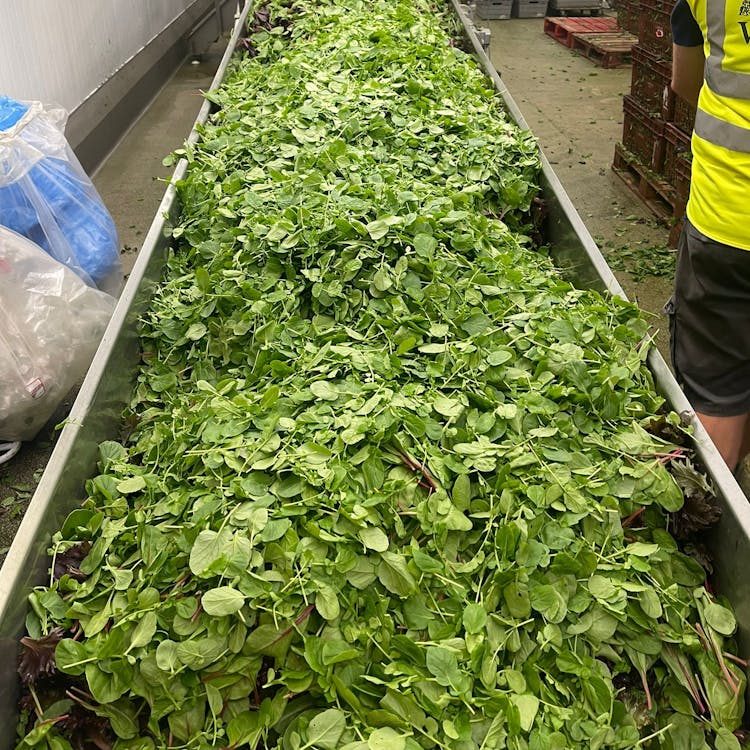Rescue Story: Not Your Standard Salad Leaves
Meet one of our salad leaf growers, L.J. Betts. Chances are, you’ve rescued some of their leaves in boxes recently.

They’ve had “too many” spinach, rocket and salad leaf crops, so we got to rescue them for your boxes. And last week, we took a trip to the farm in Kent, where farmer Nick, told us more about the leaves and the techniques they use to grow them.
Fighting food waste
Like most growers, L.J. Betts plants a certain number of crops to be able to meet order requirements for their customers. When planning these numbers, they allow themselves some wiggle room. Things like the weather can affect how well crops grow, which means they’ll often plant more crops to make sure they have enough, in case any don’t grow as they’d planned.
Of course, sometimes the fields provide a good yield (produce plenty of crops) which means they’re left with more salad leaves than their customers ordered. There are also cases where customers order less than forecasted, even after L.J. Betts have planted and grown the crops. And that’s where you step in. By rescuing with us, you’re preventing these leaves from going to waste, and making sure that the water and energy that went into growing them is put to good use, too.
On top of working with us to prevent surplus leaves from going to waste, Nick told us that they also work with another company to repurpose food waste to use as fertiliser for their fields and it’s drilled down into the soil. They’ve been trialling it for a year and they’re hoping to use more of it, And considering synthetic fertiliser (fertiliser made of chemicals) has been one of the biggest contributors to their carbon footprint, this is definitely a step in the right direction.
The groundwork
Healthy soil is vital for growing salad leaves (and just about every crop) and Nick told us a couple of things they do to keep their fields in tip-top condition. Keeping an eye on soil levels is one of these. They used to use Triple Superphosphate (a type of fertiliser) to do this, but now they also use recycled compost from the local council’s cuttings as a more natural way of maintaining organic matter levels in the soil. This organic matter helps the soil hold onto nutrients that are essential in helping crops grow well.
Nick also told us that giving fields a chance to rest helps keep soil healthy. One year they’ll grow salad leaves, the next they’ll be rested with another crop – these are called ‘cover crops’. Cover crops are really helpful in helping them look after the soil, as it means no field is left bare over the winter. But understanding how best to manage them has been a learning curve – especially understanding which cover crop is best for each salad crop.
Ploughing (that’s turning over the soil) is an important part of farming, as it brings essential nutrients to the top of the soil and helps to bury weeds. However, it’s got a bad reputation because of the carbon it releases into the atmosphere, which isn’t good for the environment. At L.J. Betts, however, they’ve found a cover crop that does the job. Thanks to their deep roots, black oats are a great alternative to ploughing and don’t release the carbon that the normal process would.
Legumes help them maintain levels of nitrates (which can pollute nearby water sources) over the winter. And brassicas help them keep nitrogen in the soil for salad crops to benefit from.
Wat-er ’bout weeds?
Did you know that rocket is the hardest crop to keep weeds out of? That’s what Nick told us. They also shared some pretty interesting insights as to how they get rid of weeds – and a lot of it comes down to water.
Once the crops have been harvested, they water the fields to encourage the weeds to grow, then flush them out before new crops grow. Rain is usually a massive help in this process, but there’s been very little (read: basically none) of that recently, which has made things a little harder.

